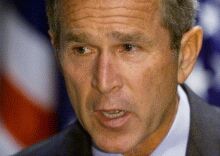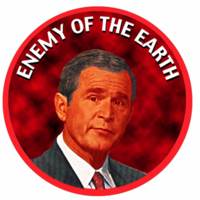Who will pay this Mr. Bush? US Taxpayer, ore the sell of Guns to Afghanistan?
J. Charles | 25.01.2002 16:59
"thousand percent increase over what our government has
spent," Bush said. "It's absolutely necessary that we spend
the money and that we spend it correctly, but we will get it back" (article 1)

Who will pay this Mr. Bush? US Taxpayer, ore the sell of Guns to Afghanistan?

Who will pay this Mr. Bush? US Taxpayer, ore the sell of Guns to Afghanistan?

Who will pay this Mr. Bush? US Taxpayer, ore the sell of Guns to Afghanistan?
there, and America is their target. Global terrorists are
relentless in their desire to attack the world's bastion of
freedom, according to President Bush.
The war against terrorism is a two-front war, the president
said here this week. While the American military is on
frontlines overseas, he wants to ensure America's homeland
is prepared to respond to an attack.
Immediately after the Sept. 11 terrorist attacks, Bush
said, federal officials acted quickly to increase the
number of sky marshals, deploy hundreds of Coast Guardsmen
to patrol ports, and station 8,000 National Guardsmen in
the nation's airports. They worked to acquire antibiotics
for large-scale treatment of anthrax and to support the
largest criminal investigation in U.S. history.
"All this came in response to a sudden emergency," he said.
"Now we must undertake a sustained strategy for homeland
defense."
The president said he would present his fiscal 2003 budget
request to Congress next week. That request, he said, will
include $48 billion in new defense spending and an increase
of nearly $38 billion for homeland security.
If approved, the funding for homeland security would double
the 2002 appropriation, the president noted. His budget
request asks for money to complete the hiring of 30,000 new
federal airport security workers and another 300 FBI
agents, he said.
"It is the beginning of a homeland defense initiative which
is going to last throughout my administration," Bush said.
"It's the beginning of a cooperative effort."
There's much to do at home, he stressed. Federal, state,
and local law enforcement agencies need to share
information. They need to do a better job of alerting
people that something might be going on in the neighborhood
and ask for their help.
"We'll purchase new equipment to improve the safety of the
mail, and protect the men and women who deliver our mail,"
he noted. "We'll begin a major program of research to
combat the threat of bioterrorism.
"We'll modernize health labs throughout the country,
improving their capacity to detect and treat outbreaks of
disease. We will ensure that state and local firemen and
police and rescue workers are prepared for terrorism. And
we will do more to secure our borders."
The Sept. 11 attacks on the World Trade Center and the
Pentagon showed the nation how important police,
firefighters and emergency medical teams are in times of
crisis. In the event of a terrorist attack, these are the
first to respond.
White House officials report the United States has more
than 1 million firefighters, of which about 750,000 are
volunteers. Local police departments have about 556,000
full-time employees, including about 436,000 sworn law
enforcement personnel.
Sheriffs' offices report about 291,000 full-time employees,
including about 186,000 sworn officers. More than 155,000
nationally registered emergency medical technicians are on
duty.
Bush proposes spending $3.5 billion in fiscal 2003 to give
these first responders money to buy equipment, train
personnel and plan for contingencies.
o About $2 billion would go to first responders for
personal protective gear, chemical and biological detection
systems, interoperable communications gear and other
equipment.
o About $1.1 billion would be used to train police,
firefighters and emergency medical technicians to respond
and operate in chemical and biological environments.
o About $105 million would be used to support state and
local governments in developing plans to prepare for and
respond to a terrorist attack. Another $245 million would
support an exercise program to improve response
capabilities, practice mutual aid, and assess operations.
Federal funds would also be used to set up a "simple and
quick" method for disbursing federal assistance to states
and localities, and to foster mutual aid across the nation
so that federal, state, local and volunteer networks can
work together seamlessly. Another objective is to involve
all Americans in programs to make their homes, communities,
states and the nation safer and stronger.
Bush tasked the Federal Emergency Management Agency to be
the lead agency in coordinating federal efforts with local
governments. "It is the right agency to choose," he said.
"They understand local disaster and the local emergency."
The homeland security "challenge," Bush said, involves
ensuring coordinating homeland defense efforts among the
36,000 local jurisdictions around the country. "How do we
make sure that the communications equipment and the rescue
equipment (are) compatible not only within a state but
nationwide?" he asked as an example.
The $3.5 billion for first responders represents a
"thousand percent increase over what our government has
spent," Bush said. "It's absolutely necessary that we spend
the money and that we spend it correctly."
Terrorists "still want to come after us," the president
said. "We're their target. And we're going to respond and
we're going to do deal with it by working together."
J. Charles
 e-mail:
cee@post.com
e-mail:
cee@post.com
 Homepage:
http://www.e-u-r-o-p-e.org
Homepage:
http://www.e-u-r-o-p-e.org